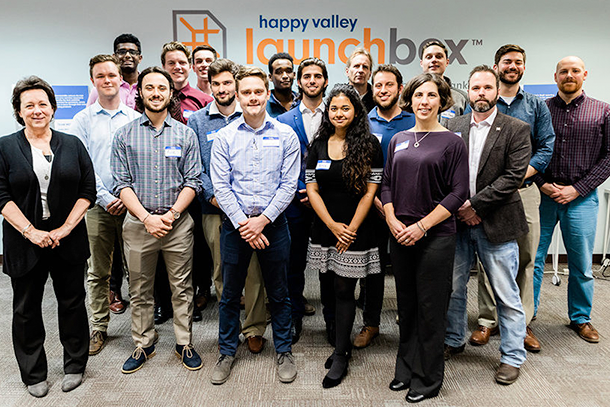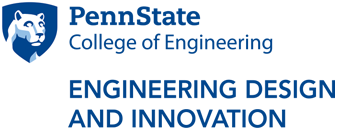
The 2018-2019 Happy Valley LaunchBox FastTrack Accelerator Cohort.
From fire safety to lending money, FastTrack startup teams pursue solutions
08/12/19
UNIVERSITY PARK, Pa. — Several new startups launched by community and student entrepreneurs recently graduated from the Happy Valley LaunchBox powered by PNC Bank FastTrack Accelerator. Their ideas spanned acne treatment; a better way to find a tech dream job or sublet an apartment; and a Smoke Shield System that increases the amount of time someone trapped in a fire can survive while waiting to be rescued.
The nine teams were chosen for the 2018-19 FastTrack Accelerator from a pool of 30 applicants. The teams met together weekly for 16 weeks and had 1-on-1 mentoring sessions with Lee Erickson, Happy Valley LaunchBox’s chief amplifier. As part of the program, each team received no-cost work space at LaunchBox, expert mentorship, no-cost legal and IP advice, and more. The purpose of the program is to progress the teams rapidly and help them avoid common and costly mistakes made during startup.
One team, Pinch, founded by Penn State grads Connor Amos (class of 2019, corporate innovation and entrepreneurial studies), and Rick Carabba (class of 2019, materials science and engineering), had a business idea that allowed students to lend and borrow small amounts of money for short periods of time from open-source individual lenders. One of the first business assumptions they made was that this is legal, when in fact it is not; companies can’t charge interest like a bank does. However, through working with Penn State Law Entrepreneurial Assistance Clinic and LaunchBox’s finance mentor network and advisers, Pinch learned it is legal to charge a transaction fee. The company is lending money right now as a result.
One main focus of the FastTrack program is customer discovery. Teams find customers, meet with them, gather feedback, and often change their product or business based on that feedback.
While some startups primarily needed assistance vetting the legality or practicality of their business, startups like Argolytics used FastTrack to beta test their program with real customers. Customer feedback indicated the platform interface needed to be more user-friendly and they needed to incorporate a predictive element to add real value. Since making these changes, they’re busy re-testing the new and improved product.
For Nicholas Welch, founder of Smoke Shield, the customer discovery process didn’t change his product, but it did change his perspective of the entire business.
“Forget what you think you know,” advised Welch. “Concentrating on development of your product is only about 15% of running your business. The FastTrack Accelerator and other programs give you the 10,000-foot view so you can see the big picture.”
Welch was inspired to create Smoke Shield when he was putting his young children to bed and noticed the light switch was hot. He realized the smoke detectors in their rooms probably wouldn’t alert them in time to safely escape. After an exhaustive search, he said, he couldn’t find satisfactory fire safety options, especially for children. Despite having just earned a medical degree, Welch began developing his product, which provides users with breathable air for up to an hour in their closets.
“Smoke deaths outnumber fire deaths,” said Welch. “People can’t always escape, but if they can breathe where they are and have more time to be rescued, it could be the difference between life and death.”
Welch started by taking a drawing of his idea to Ray Hayden at the Small Business Development Center in Wilkes Barre, and this connection opened the flood gates to a wealth of other programs. Hayden connected him to the Penn State Law Entrepreneur Assistance and IP Clinics, which helped him patent his idea and incorporate as a business.
Welch also used the Learning Factory to meet and hire engineers to help build Smoke Shield. The engineers who Welch met, Mark Boudreau and Colby Geary, both work for the company full-time now.
“Nick did a great job at leveraging multiple entities from across the state,” said Erickson. “He worked with everyone from engineers at the Learning Factory to marketing people at the Think Center.”
“For a very low cost there are unbelievable resources available to entrepreneurs in Pennsylvania,” said Welch. “The connections I’ve made along the way will always be there for me.”
Erickson says the FastTrack Accelerator is ideal for entrepreneurs who have a clear idea of the problem they’re trying to solve, think they know who their customers are, and have taken some action to bring their idea to life.
“Ideas are easy,” said Erickson. “Execution is hard. FastTrack helps prevent common mistakes made during early execution.”
The 2018 Fall FastTrack Accelerator Teams were:
- Aspire software helps position computer science students at Penn State to be candidates for top tech company internships.
- DermatoloMe developed a quicker and less inexpensive way of identifying the best treatment for acne patients.
- AIODA uses chat bots to connect students and advisors 24 hours a day.
- Argolytics makes web-based software that helps manufacturers assess the quality of their product with an affordable, accurate quality control reporting software.
- fountaa helps venues reduce waste and increase safety with portable, inexpensive water stations.
- Club Companion is an interactive stuffed animal created to decrease anxiety in 6–8-year-old cancer patients.
- Pinch makes it easy to lend small amounts of money and get paid back.
- Southern Safety Products, LLC, is developing a system that provides clean air to individuals unable to exit their home during a fire.
- Looped Lease streamlines subletting by connecting subletters with renters.
Past Happy Valley LaunchBox program graduates include startups such as Phospholutions, Project Vive, Moichor and Reflexion Interactive.
FastTrack Accelerator 2019-20 applications open Aug. 20. For more information, visit https://launchbox.psu.edu.


